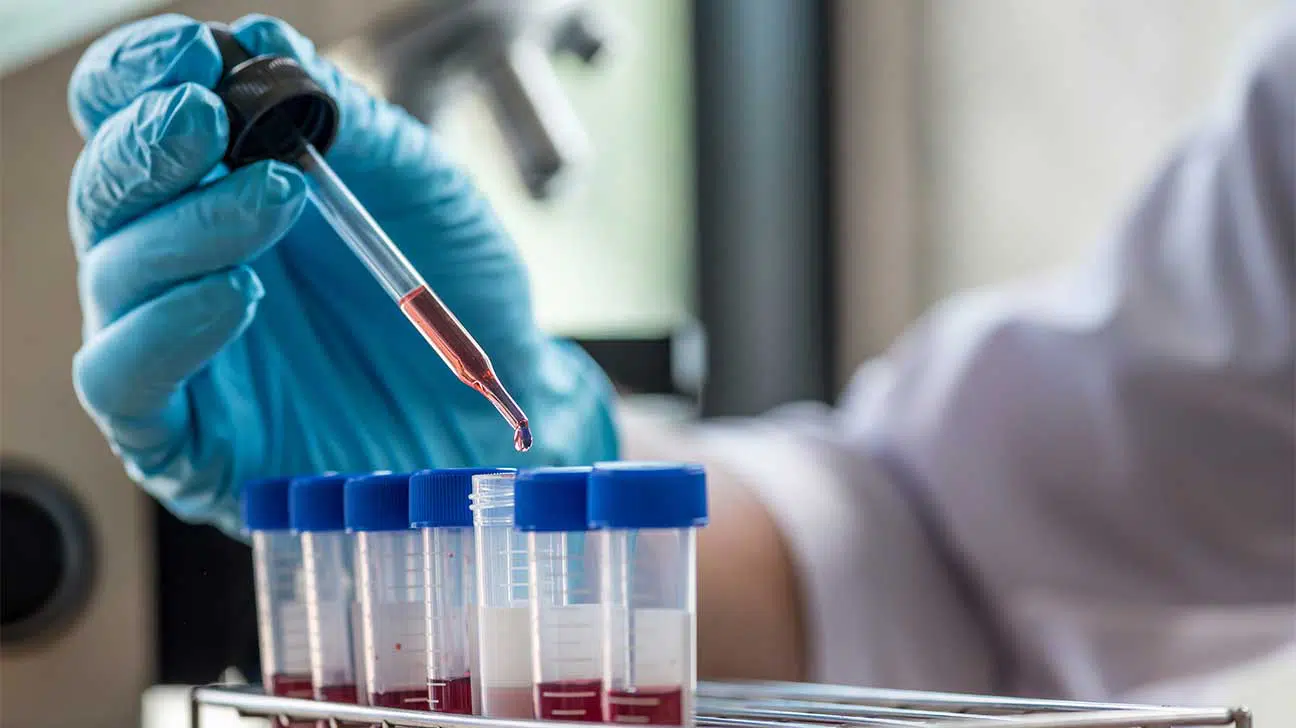How Long Can Drugs Be Detected In Blood?
Blood drug testing can provide accurate results of recent drug use. Detection times of drugs found in a blood test can vary depending on the type of drug used and other biological factors.

Using blood to test for drugs is a less common method than urine or saliva, but it can be beneficial for certain applications.
On average, drugs show up more quickly in a blood sample but cannot be detected for as long as other sample types, such as oral fluid.
In rare cases, you may not be able to get a blood sample due to poor venous access (difficulty drawing blood from a vein).
In these circumstances, another comparable drug test would be requested.
Other types of drug tests that are requested include:
- a urine drug test
- a saliva/oral fluid drug test
- a hair drug test
- sweat chromatography
What Does A Blood Drug Test Show?
Blood testing is frequently used in cases where recent drug use is suspected. Depending on the drug, recent drug use can mean anywhere from 2 to 16 hours prior to the drug test.
These tests can show the actual amount of a substance present in a person’s blood, instead of testing for metabolites as a urine sample would show.
Blood testing can be a more difficult process, as samples must be collected by a trained phlebotomist and sent to a laboratory for diagnostic testing.
Who Would Request A Blood Drug Test?
Because blood testing tends to be more invasive and expensive than other types of illicit drug screenings, it is not commonly used for workplace drug testing.
Blood testing is requested in instances where proof of recent substance use is needed.
Law enforcement will sometimes request blood tests to be used in certain circumstances, such as a car accident where drugs or alcohol were a suspected reason for the crash.
Blood tests are considered to be more accurate than urine or saliva tests, but it can take several days to a week for toxicology results to be available.
They’re typically administered in a healthcare setting, such as a hospital or medical clinic.
Blood Drug Test Results Detection Times
Blood tests typically look for the actual parent drug of a substance, which means a positive test result can be found nearly immediately after the last use.
Different drugs have varying windows of detection in the blood.
Detection windows of drugs in the blood include the following:
- Alcohol detection: 10 to 12 hours
- Amphetamine detection: 12 hours
- Barbiturate detection: 1 to 2 days
- Benzodiazepine detection: 2 to 3 days
- Cannabis (THC) detection: up to 2 weeks
- Cocaine detection: 1 to 2 days
- Codeine detection: 12 hours
- Heroin detection: 12 hours
- Hydrocodone detection: 2 to 3 days
- LSD detection: 2 to 3 hours
- MDMA (ecstasy) detection: 1 to 2 days
- Methadone detection: 2 to 3 days
- Morphine detection: 6 to 8 hours
- PCP (phencyclidine) detection: 4 to 5 days
Drugs Detected Through Blood Tests
Typically the more detailed a blood test is, the more drugs that can be tested for.
Detailed tests can often be very expensive to run, which is why a standard panel for drugs of abuse is usually requested for routine screenings.
These screenings usually include testing for:
- alcohol
- amphetamines (methamphetamine, MDMA)
- barbiturates (Phenobarbital)
- benzodiazepines (Xanax, Valium)
- cocaine metabolites
- phencyclidine (PCP)
- THC metabolites (cannabinoids, cannabis)
- opiates and opioids (Oxycodone, Fentanyl)
- buprenorphine
- tramadol
- gabapentin
Factors That Affect Drug Detection Times In Blood
There are several variables that could impact the amount of time drugs are detectable in a person’s blood.
The amount of a drug that was used can greatly affect the length of time it can be detected by a blood test.
Some drugs can be metabolized more quickly than others and have a shorter half-life, meaning the body is able to clear them from its system more quickly.
This means the blood test would need to be administered shortly after the drug was used in order for it to return a positive result.
Biological factors that differ from person to person can also impact how long a drug remains detectable in blood including:
- metabolism
- age
- body mass
- hydration levels
- presence of other stimulants in a sample
Get Help For Addiction Today
If you are searching for treatment for drug or alcohol addiction, you are not alone. Spring Hill Recovery Center is here to help.
We offer personalized addiction treatment plans that include dual diagnosis care, holistic therapies, residential inpatient treatment, and intensive outpatient services.
You don’t have to wait to start treatment for drug or alcohol abuse. Call today and one of our qualified addiction specialists will guide you through our treatment plans.
- National Center for Biotechnology Information — OBJECTIVE TESTING – URINE AND OTHER DRUG TESTS https://www.ncbi.nlm.nih.gov/pmc/articles/PMC4920965/
- NIH — Drug-testing methods and clinical interpretations of test results https://pubmed.ncbi.nlm.nih.gov/7920539/#:~:text=The%20most%20sophisticated%20drug%2Dtesting,of%20the%20%22negative%22%20samples.
- Substance Abuse and Mental Health Services Administration (SAMHSA) — Drug Testing https://www.samhsa.gov/workplace/drug-testing
- University of Michigan Health — Toxicology Tests https://www.uofmhealth.org/health-library/hw27448
- U.S. Department of Transportation — Drug Testing Laboratories https://www.transportation.gov/odapc/labs


